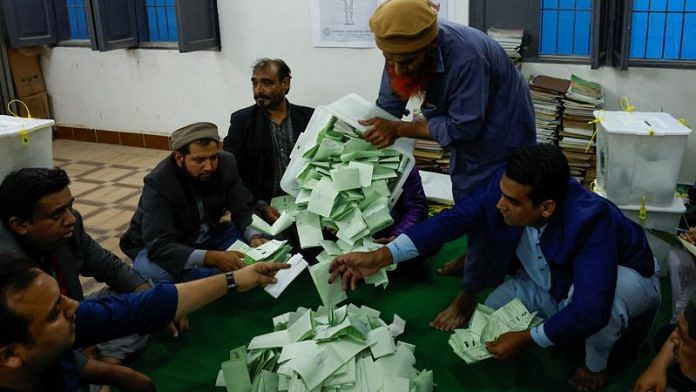New Delhi: Election results in Pakistan have dashed the hopes of many people in the country who were expecting political stability. Right now, Pakistanis are an anxious lot, with commentators certain that “elites will have no problem continuing the old game of making and breaking governments”.
While Shehbaz Sharif of PML-N and Bilawal Bhutto-Zardari of PPP have held talks and agreed on a potential partnership, there is no sign of a government in making yet. PTI-backed independent candidates have approached courts with allegations of vote-rigging. The independents have won 93 seats in the National Assembly of 266 directly elected members, surpassing PMLN (75 seats) and PPP (54 seats).
With this result, Pakistan faces the challenging task of navigating its political future amid calls for transparency, accountability, and a commitment to democratic principles.
“What is an election with missing politicians? It is perhaps the same as peace without justice,” lawyer Abdul Jafferi wrote in Dawn, highlighting the general sentiment towards the 2024 election. He said that the Supreme Court’s had an opportunity to right many wrongs when it the Election Commission banned PTI from using its electoral symbol ‘bat’. But it chose not to.
“A phoenix comes but once. Decide against being courageous, and it will go away and never return. On Saturday, Jan 13…the phoenix watched for nine hours before it finally winked out,” he wrote on the Supreme Court’s decision upholding the ECP order.
Concerned voices ring the alarm
The unexpected election outcome is particularly noteworthy given the obstacles faced by PTI—lost election symbol, banned from campaigning, and leader Imran Khan behind bars.
“This election was always going to be a vote for and against Imran Khan,” Abbas Nasir, ex editor of Dawn, wrote. The newspaper wrote a scathing editorial, telling the establishment to “respect the mandate”: “the state must realise that, sometimes, a vote for the underdog is a vote against the establishment.”
Despite being the single largest bloc, the PTI-backed candidates face challenges in forming the next government. Nawaz Sharif’s party won the most seats, but the potential for defections and coalition-building adds uncertainty.
Commentator Attiya Munawer wrote in The Nation that “a strong and stable political government will not be able to be established in the country, nor will the democratic institutions be able to gain stability… On the contrary, even after the recent elections, the elites will have no problem continuing the old game of making and breaking governments through political manipulation to achieve and protect the interests.”
While Pakistani journalist Najam Sethi views the election results as a display of defiance against the powerful military establishment, others express disappointment and anxiety about the future political landscape.
‘Selection’ continues to be a popular term to describe Pakistan elections, reflecting a perception that certain individuals or groups are predetermined to govern.
“Pakistan is amongst those unfortunate countries where it is already believed and decided who is good for the country. And when such an assessment is already made that goodness can only reflect into practice when those that are presumably considered good can not only win elections but secure power and remain unchallengeable even when they are not popular. No wonder, the term ‘selection’ is more popular in Pakistan than the term ‘election’. Why is the ‘seizure of political process’ the destiny of countries like Pakistan?” asked political analyst Muhammad Ali Ehsan in his article for The Express Tribune.
Social media: the new battleground
Meanwhile, social media has become a battleground for diverse opinions, with hashtags like #PrimeMinisterImranKhan trending and a wide array of reactions ranging from criticism to poetic expressions.
International voices, including former US Ambassador to UN John Bolton, have raised concerns about the credibility of the election, calling for a thorough investigation into alleged rigging.
Responding to Bolton, commentator Moeed Pirzada posted on X that the 2024 elections “were the worst rigged in the history of Pakistan”.
“What’s happening in Pakistan is a threat to post-war Liberal Democratic Order everywhere! United States should refuse recognising the illegitimate Govt being created by generals till Election rigging are satisfactorily investigated,” he wrote.
Pakistani-American economist Atif Mian chose to focus on the post-election problems for Pakistan in an elaborate X thread discussing the economic prospects of the country.
Actor Khaled Anam chose to talk about his sentiments in a poetic manner: “Jeet aur itni paleet, haar aur itni shandaar, Dekh iss badlav ko waqt ki yahi pukaar, Badshah ho ya faqeer, inteha’an sab khaak hai!
(Edited by Prashant)



